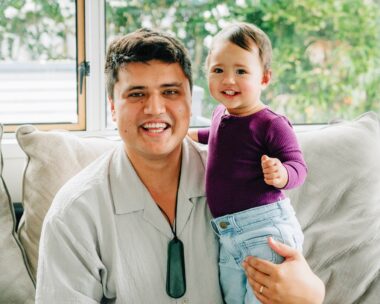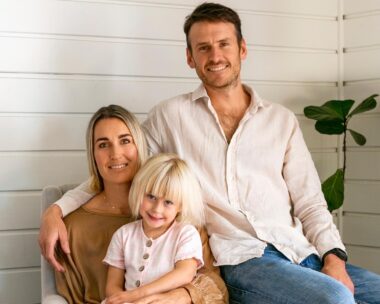They look like a typical loving mother and child – the little girl skipping happily and holding hands with the smiling woman as they walk along the beach. The woman calls out, “Be careful!” as the child races away to clamber over the rocks.
The pretty four-year-old calls back, “I will, oum.”
But Maria* is not Rachel’s mother. In fact, Maria will never be a mother because she was born with a rare condition that means she has male genes and her ovaries were actually testicles.
Maria, who found out about her condition in her teens, has told only a handful of people her secret. one of these is her sister – Rachel’s real mum – who is allowing Maria to help raise her little girl.
Maria was devastated to be told she would never have children of her own and says Rachel’s love has kept her going through some very tough times. “She’s my everything. She gives me strength,” says Maria. “Without her, I don’t think I would be here.”
Maria was only 19 when she learned she had Testicular Feminisation Syndrome, also known as Androgen Insensitivity Syndrome (AIS). People with this genetic condition appear female but have male XY chromosomes and internal testes instead of ovaries.
There is speculation that both Joan of Arc and Queen Elizabeth I had AIS. Maria began wondering if there was something wrong with her when she was about 13. “oy friends were developing and I wasn’t. I didn’t have any pubic hair and I didn’t get my period. Something didn’t feel right but I had no idea what it could be.”
She became very private, making sure nobody saw her changing her clothes. Finally, at 19, she consulted her GP, who tested her hormone levels. The results were shocking. “oy testosterone levels were through the roof and my oestrogen levels were virtually nonexistent. It was pretty upsetting to hear but it was also a relief to finally find out what was going on.”
Maria was referred to a specialist who carried out more tests, including a pelvic scan. When she went to get the results, she was given news that would turn her world upside down.
“I was told that what should have been my ovaries were, in fact, fully developed testicles. They were attached to oversized Fallopian tubes that weren’t attached to anything else.”
Maria also learned that, although she had a uterus, she didn’t have a cervix. These problems meant she would never be able to have children. “For me, that was the worst thing of all. I had thought that even if I couldn’t actually conceive a child myself, maybe I could use donor eggs and carry a baby. But even that was not possible.
“I’ve always wanted children, for as long as I can remember, so to be told I couldn’t have them was devastating.”
There was even more distressing news to come. “I was told the testicles had the potential to become cancerous and would need to be removed. I told the doctors to do whatever they had to. My life was already screwed.”
After the surgery, Maria began suffering menopausal symptoms. “I thought, `Great, just what I need.’ I had hot flushes and I was extremely emotional.” She’s supposed to take HRT but has decided not to.
“I don’t want to take medication for the rest of my life. I’ll just handle the symptoms. Luckily, I have great support.”
Maria’s sister and a couple of close friends have constantly been there for her. Sadly, she has never got on well with her mother and hasn’t been able to bring herself to tell her mum what she has gone through. “
She knows I can’t have kids but that’s all,” says Maria. “But my grandmother knows the truth and she has been great.”
By her mid-twenties, Maria felt disillusioned with life. She drank heavily, used drugs and seemed not to care what happened to her. Then a close friend was killed in a car crash caused by drugs and alcohol and Maria began thinking about what she was doing to herself.
“It was time to sort myself out,” she says. “I had been dealing with what happened to me by turning to drugs and alcohol and I realised that what I was doing was only making things worse.”
She stopped drinking and taking drugs and enrolled in a diploma course at a local polytechnic. The qualifications she earned there enabled her to go to university and three years later, she had a degree. She now has a good job in the tourism industry and is saving to buy a house.
“Throwing myself into my studies helped me to get through everything,” says Maria. “But what really kept me going was Rachel.”
Maria, now in her early thirties, lives close to Rachel’s parents and is very grateful to them for letting the two of them bond.
“It’s not easy to let someone else be so involved with your child but they are great. She started calling me oum when she was about a year old and they’re okay with that. It makes me very happy.”
Another thing that would make Maria happy would be to have a man in her life. She has never been in a serious relationship. “I would like to meet someone but it’s so hard. I would feel bad about not being able to give a partner children and how are you supposed to tell a man you were born with this? It’s too embarrassing so I’ve put the whole thing in the way-too-hard-to-deal-with basket.”
Maria has kept her condition secret – not because she’s ashamed but because she doesn’t think she could cope with people’s reactions. “The few people I have told have been good but I don’t think everyone would be like that. A lot simply wouldn’t understand.”
She says the reaction she would hate most is pity. “I don’t want people to feel sorry for me. I just want them to be aware that things like this can happen and it doesn’t make me so different.
“I don’t feel sorry for myself – I’ve come too far for that and far too many good things have come out of this, such as getting a good education and job. I don’t think I’d have been so motivated if it wasn’t for having this syndrome.”
And then there’s Rachel. “If I had been able to have kids of my own, I would never have had the bond I have with her. And I wouldn’t change that – she means the world to me.” *As told to Donna Fleming
** Names have been changed.




